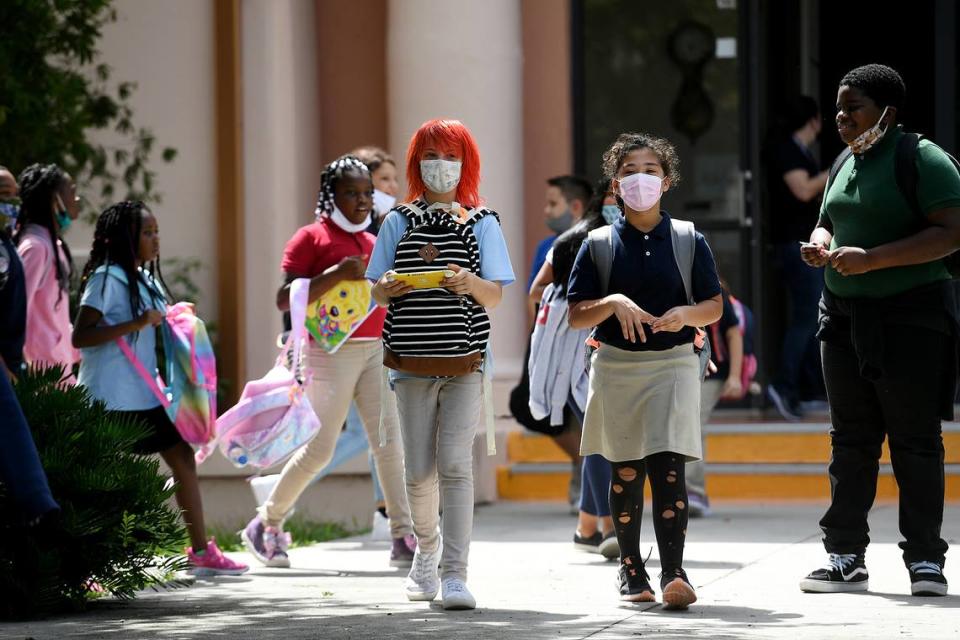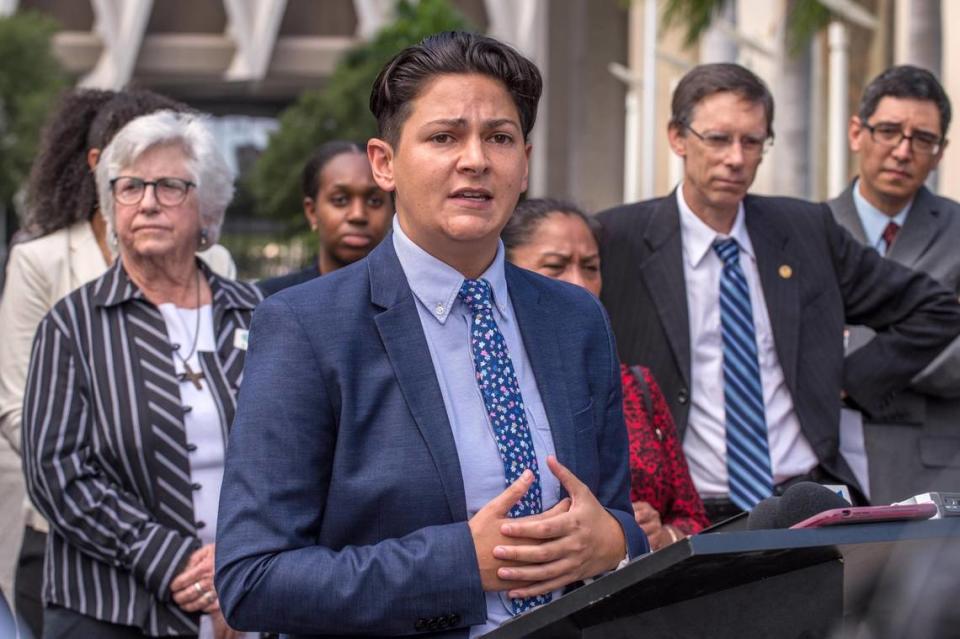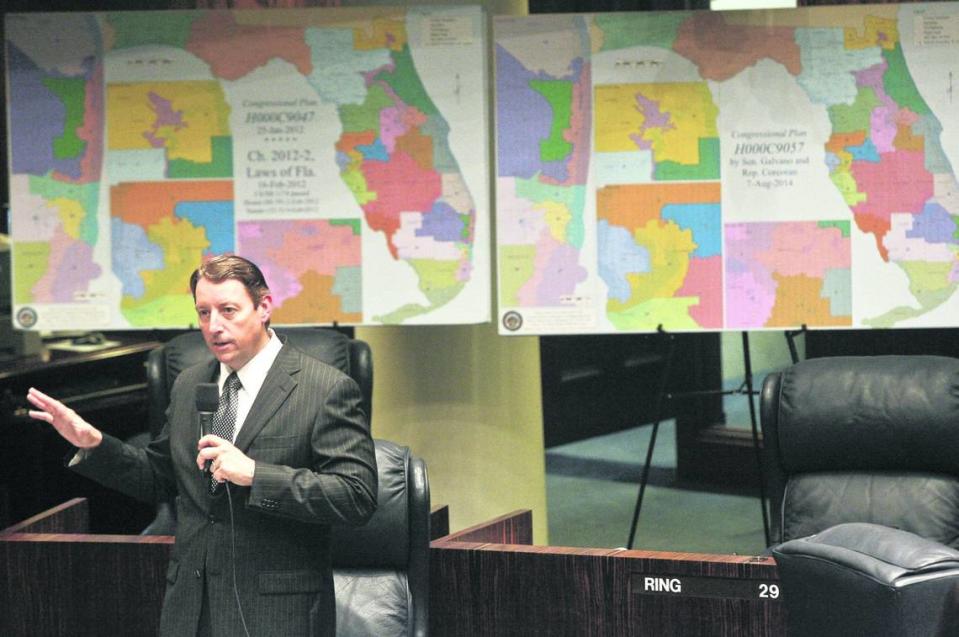Florida’s new vax-ambivalent surgeon general, another law overturned, soft start to redistricting
It’s Monday, Sept. 27 and the number of new COVID-19 cases in Florida is dropping. Does that mean more people are eating their fruits and vegetables?
That is the question for Florida’s new surgeon general, Dr. Joseph Ladapo, appointed by Gov. Ron DeSantis last week to be the state’s top infectious disease expert in year two of the global COVID-19 pandemic.
Ladapo distinguished himself from the majority of the medical community and drew immediate criticism last week when he declared that vaccinations to prevent COVID-19 have been a bit too hyped.
WHAT WE’RE TALKING ABOUT
“It’s been treated almost like a religion,’’ he said at a news conference with the governor at his side. “And that’s just senseless, right? There are lots of good pathways to health. And vaccination is not the only one. We support measures for good health. That’s vaccination, losing weight. It’s exercising more. It’s eating fruits and vegetables.”
Maybe it was garbled messaging, but there is no data to suggest that a healthy diet can prevent you from getting seriously ill if you’re infected with the contagious COVID-19 virus. There is data to suggest that the COVID-19 vaccine, however, does prevent serious illness.
First order = fewer quarantines: One day into his tenure as the state’s top public health official, Ladapo signed a new order taking masking and quarantine decisions out of school officials’ hands and leaving it up to families’ “sole discretion.” No longer can public schools require students exposed to the virus to be quarantined. Instead, if a child has been exposed but is not showing any symptoms of being infected, it is now up to parents to decide if their child should stay home or not. If a child shows symptoms, the recommended quarantine remains in place.

Lawsuits halted, reimbursements begin: The DOH rule had the immediate effect of bringing to a halt the lawsuits from school districts challenging the state’s ban of strict mask mandates. The U.S. Department of Education also began compensating Florida school board members whose pay DeSantis’ administration docked this month for defying the governor’s ban on mask mandates.
Waiting for evidence on natural immunity: Ladapo was also quick to endorse the governor’s unsubstantiated view that natural immunity from being exposed to COVID-19 is the equivalent of immunity from the vaccine. Infectious disease experts and vaccine researchers say the truth is not that simple. They still don’t have enough evidence about the novel virus —which mutates rapidly and which scientists are still struggling to understand — to know how durable natural immunity can be.
Ladapo, an outlier: Ladapo has a history of deviating frequently from the medical establishment consensus. That has made him a target. U.S. Rep. Charlie Crist, a Democrat and former Florida governor who is running for the seat again, joined a chorus of Democrats and called Ladapo’s new rule that allows infected kids to return to classrooms “unconscionable.”
As cases drop, treatment supply drops too: Last week, as DeSantis was touting the decline in both cases and hospitalizations, the federal government said Florida would be getting less of the monoclonal antibody therapies supply as it was more needed in other states. That didn’t make Tampa General Hospital CEO John Couris happy. The hospital executive has been a vocal advocate of the governor’s messaging for months.

Santuary cities law thrown out: Another Florida law has fallen in federal court. This time, a federal judge in Miami blocked Florida from enforcing a ban on so-called sanctuary cities, declaring portions of the 2019 law unconstitutional and tinged with “discriminatory motives.” The judge’s ruling struck down a key portion of the law championed by DeSantis that prohibits local and state officials from adopting “sanctuary” policies for undocumented migrants, even though there were none in the state.
WHAT WE’RE WATCHING

Our Democracy, an evening to remember: Florida Humanities, in partnership with The Village Square, is hosting a provocative discussion Thursday, Sept. 30, with Harvard Political Science Professor Dr. Danielle Allen. She’s the author of “Our Declaration,” a book that takes a deep, contextual look at America’s founding text and examines what it means in this moment of pandemic-fueled fear, culture clashes, misinformation wars and racial tension. Learn more here.

Time-out on sports betting? Two Florida pari-mutuels filed a new motion in federal district court in Washington last week asking a judge to block implementation of online sports betting under the Florida tribal gaming compact which is scheduled to begin later this year. Magic City Casino and Bonita Springs Poker Room are suing U.S. Secretary of the Interior Deb Haaland alleging that although the Department of the Interior allowed the compact to take effect, the court should reverse that decision and block implementation until a legal sports-betting compact is established for Florida.

Inequity baked into electric bills: Florida Power & Light witnesses admitted to state regulators last week that its proposed $1.53 billion increase in rates over the next four years will cost residential customers disproportionately more than the rate increase imposed on the state’s largest commercial and industrial businesses.
The statements from FPL witnesses came under cross examination during a one-day hearing to review a proposed four-year settlement between the state’s largest utility and other interested groups. The company’s data show that residential customers will pay $1 billion more in increases than industrial customers under the proposed settlement.
Black farmers edged out of marijuana licenses: When Florida created the modern medical marijuana industry in the state four years ago, a special license was stipulated to go to a Black farmer. It still hasn’t happened.

Redistricting: Will they follow law this time? As Florida legislative leaders launched their once-a-decade remapping of political boundaries last week, they vowed to avoid the pitfalls that got them into trouble with the court 10 years ago.
Both the House and Senate redistricting chairs ordered legislators to record and preserve all communication related to drawing maps. House Chair Tom Leek, a Republican from Ormond Beach, said the House will only allow staff and legislators — not political consultants — to draw maps. And both chambers said they will include political data to help them determine if they are preserving minority districts, as required by the Florida Constitution. It’s a tricky situation as we spell out here and here.
We’ve put together the congressional, state Senate and state House districts maps with the margins between the top two presidential candidates in 2020, the racial and ethnic breakdowns according to the new 2020 Census data, and the change since 2010. Take a look.
GOP closes voter registration gap: The gap between registered Democrats and Republicans in Florida, which has been narrowing for years, is nearly gone. Despite two decades of Republican dominance on a statewide level, Democrats in Florida have managed to maintain their edge in the number of registered voters. But that lead is now down to about 24,000, according to data from the Florida Department of State — far from the 558,000-voter-advantage Democrats had a decade ago.
Reasons? In addition to the voter registration drives pushed by Republicans, Democrats report that active voters were removed from the rolls at a faster pace in blue counties than red counties and third-party voter groups, such as Voto Latino or the League of Women Voters have been hampered in registering voters during the pandemic.
Subdued race to replace Hastings: The 11 Democrats seeking to replace the late U.S. Rep. Alcee Hastings aren’t getting national attention from the progressive and establishment wings of the party. A virtual candidates’ forum recently yielded zero political attacks.

Democrats divided over Haiti: Tensions mounted last week between Hailtian-American lawmakers and the Biden Administration. After they asked for a pause in deportations and a speeding up of asylum processing, they were met with silence. Then, after images showed horse-mounted Border Patrol agents confronting Haitian migrants, the administration responded by sending more deportation flights to Haiti.
Good news for green card holders: Immigration authorities, however, announced a technical change that will benefit thousands of immigrants who obtained U.S. permanent residency or green card status through marriage with a U.S. citizen. The U.S. Customs and Immigration Service gave permanent residents with temporary green cards obtained through marriage an extension of evidence of their legal status for 24 months past the expiration date.
State workers hit by outbreaks: Eighteen months into the pandemic, Florida’s 105,000 state workers are struggling. Agencies under DeSantis’ control began ordering employees back to their offices last October. Masks and social distancing were optional. Since then, COVID-19 outbreaks have closed departments and offices. Three state prisons are closing because of the lack of corrections officers. When their colleagues fall ill, some state employees say they aren’t being told. Since then, state agencies have disclosed little publicly about how their employees have fared.
Employees at the departments of State, Economic Opportunity and Highway Safety and Motor Vehicles have complained to their union that they don’t learn about colleagues testing positive for COVID-19 until 14 days after the person was sent home.

In reversal, state says it will accept money for hungry kids: After saying the money wasn’t needed, Florida’s Department of Children and Families last week said it is applying for $820 million in federal food funding for needy kids after all. That means parents of up to 2.1 million children could receive $375 to pay for food for each child over the summer.
Cybersecurity stalls: Florida lawmakers learned last week that not one penny has yet to be spent on the $30 million allocated for a host of cybersecurity measures in to shore up the state’s defenses. The announcement comes after months of high-level departures in the office, which have alarmed observers who say the state was already short-staffed to defend against a rising number of cyberthreats. The state’s licensing agency was brought down by a cyberattack last year, and the personal information of at least 58,000 unemployment recipients was stolen by attackers.
Ben & Jerry’s draws heat: Florida continues to move closer to ending financial ties with ice cream giant Ben & Jerry’s and its parent company, Unilever PLC. The state has about $139 million in holdings in Unilever and its subsidiaries. The company is expected to be added to what is known as Florida’s list of “scrutinized companies that boycott Israel,” prohibiting state investments and contracts with the companies.
The protest is over Ben & Jerry’s selling its products in the West Bank and Gaza in 2022. Other states, including New Jersey and Arizona, have taken similar action.
Stay well and we’d love to hear from you. Miami Herald Capitol Bureau Chief Mary Ellen Klas curates the Politics and Policy in the Sunshine State newsletter. If you have any ideas or suggestions, please drop me a note at meklas@miamiherald.com.
Special offer: The Miami Herald needs your support if we are to continue to supply the meaningful local journalism you count on during these unprecedented times. We’ve lowered our monthly rate for unlimited digital access to $.99 a month. Check it out!
Know someone who’d like to get this newsletter? Send this to a friend to receive it weekly.

 Yahoo Movies
Yahoo Movies 
